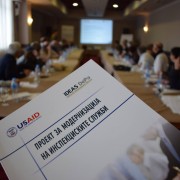Speeches Shim
The Republic of Macedonia separated peacefully from Yugoslavia in 1991. However, it is yet to complete political and economic reforms required for European integration. The 2016 European Commission’s Progress Report on Macedonia outlined a number of issues that the country must address, including weak checks and balances; rule of law and protection of human rights; as well as media independence and freedom of expression.
Enhanced Parliamentary and Party Capacity for Public Engagement Component
Start date: April 1, 2012 Duration: September 2020
Implementer: CEPPS/National Democratic Institute (NDI)

In partnership with the Center for Development Policies (IDEAS DePo Skopje) as the implementer, the USAID Modernizing the Inspection Authorities (MIA) Project works directly with the Ministry of Information Society and Administration (MISA), the Inspection Council (IC) and other inspection authorities to improve the effectiveness of the inspection bodies, by streamlining of legislation, capacity building and professional development of inspectors, and implementation of an e-governance software solution. This will lead to a modern, business-friendly, and predictable inspection system, and efficient inspection authorities.

Promoting Interethnic Integration Throughout Macedonia: On March 15, 2017, over 1,200 teachers, parents, students, school administrators, municipal leaders, and Ministry of Education officials from all corners of Macedonia celebrated the accomplishments of USAID's Interethnic Integration in Education Project (IIEP), a five year initiative that is coming to a close. The project reached all of Macedonia's 430+ primary and secondary schools, establishing nearly 400 partnerships between schools of different languages of instruction; training over 20,000 teachers to engage with diversity; and reaching tens of thousands of students through school- or community-level activities contributing to better interethnic understanding. In addition, 63 schools were renovated with the funding from the U.S. European Command, leveraged with the Ministry of Education and municipalities' resources, benefiting 46,000 students and 5,000 teachers across the country. While ethnic integration requires an ongoing effort, the massive engagement and support for IIEP's activities proved that ethnic integration is both needed and possible
Strengthen literacy and numeracy skills of early grade students.

Comment
Make a general inquiry or suggest an improvement.